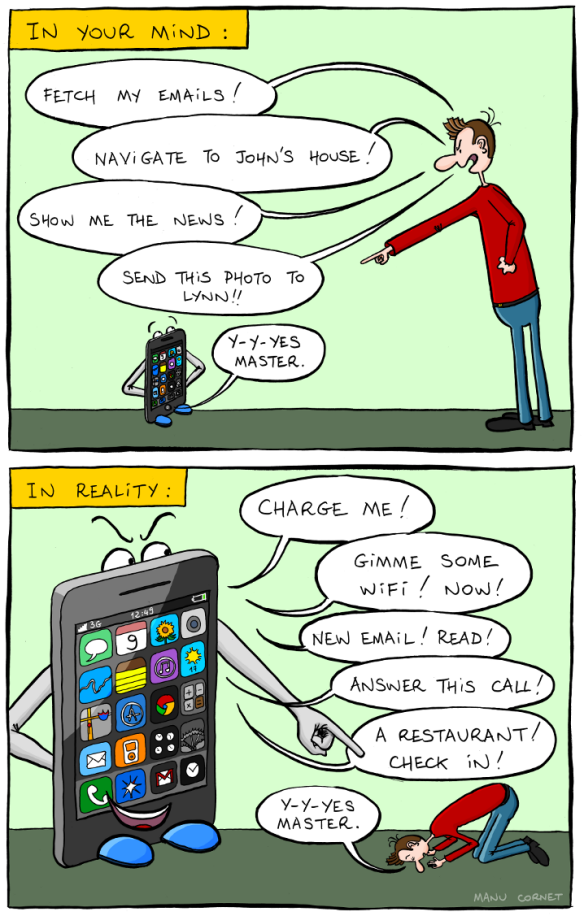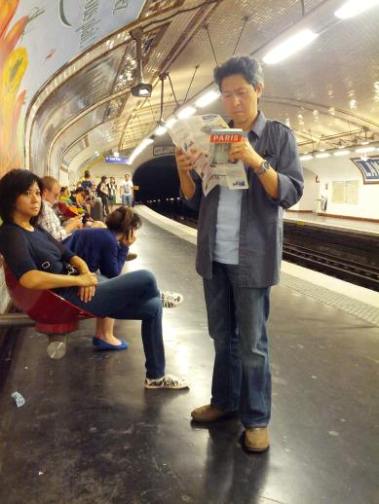I recently read a few articles about how addicted my generation is to technology. Everything from nomophobia (fear of not having your mobile phone with you), to the experiments done with students going mobile phone / TV / and computer-free for 24 hours or a week.
And the results were consistent around the world. People felt disconnected, anxious and often at a loss for what to do with themselves. One article described teens having anxiety attacks and failing to get through a whole day. There were definite withdrawal symptoms similar to drug cravings.
Personally, I’ve also felt the eerie feeling as though I was missing a limb when I’ve left my phone at home on a workday.
So, very simply, I’m probably just as bad as most of the students in the studies. But, being the perfectly capable person that I am, I was convinced I could get through a day without technology better than most. So my flatmate and I did a tech-free day.
24 hours without using smartphones or computers. Midnight Friday night till midnight Saturday night. And, just for fun, we scaled back the technology available to be used to only be things that have been around about 30 years ago. So the microwave was out, as were my soft contact lenses and electric guitar tuner etc.
I did still have my phone with me, for emergencies and in case my family called. My family had been allocated a specific ringtone so that I knew it was them.
Here are some of my learnings:
There are countless compulsions to turn to technology for entertainment throughout the day
You don’t realise how addicted you are to something till you try to go cold turkey.
I had repeated inclinations whenever I wasn’t doing something specific to grab my phone or my laptop. For example, apparently I have a strong urge to use technology (Netflix and Facebook) to decompress at the end of the day. It’s low-energy entertainment. I didn’t realise how strong this compulsion was until I was in a position where I “couldn’t” do it.
Wanting to grab my phone or laptop was also a thing that occurred first thing in the morning, or whenever we’d just finished cooking, or cleaning up, or eating, or any other discrete activity. Something was done, so you turn to your phone to see what is going on in the world. It happened A LOT.
Technology is also used as a utility a lot of the time
The one time I grabbed my phone and just started using it during the day was after Sarah had accidentally started using the microwave. She had forgotten the microwave was off-limits. I laughed, and made a sign for the microwave to remind us not to use it:
Having made the sign, I was amused and wanted to grab a quick photo of it for this blog post. I had whipped out my phone and was in the middle of unlocking it before I realised what had happened and stopped myself. The behaviour was just that ingrained.
What was interesting for me was that I didn’t feel guilty for almost using my phone as a camera because I’d been trying to use it in the aid of something practical, not as entertainment per se.
Similarly, later on in the day we went to look at some of the sights recommended in our area as recommended in Hidden Treasures of London by Michael McNay. It provides a very low-detail map of the area with the sights marked. So we needed a map with greater detail to find it. Normally this would involve a quick search on Google Maps or Citymapper.
Instead, we resorted to the tried-and-true London A-Z. (Our version was hilariously from 1995, but not too inaccurate!) Navigation is a little stressful when you don’t have a “You are here” icon, we found. 😉
Navigating with technology-free methods was ok, we got there without any major issues, but it’s far far more efficient with a phone. Similarly, one of our desired destinations was closed on Saturdays, which we would have found out from a quick Google search, had we been using a phone. We were left to just gaze in through the windows. In this case, I feel like not using technology had been a disservice to us because we hadn’t been using its potential utility.
So there was clearly a difference in my mind about whether I was using technology for entertainment or as a means to getting something else done.
We became far more efficient without the technological distractions
When you don’t have an excuse of “just checking your email quickly”, procrastination subsides dramatically. For example, usually, one of us would cook, and the other would eventually get around to cleaning up the dishes within an hour or two. Without a laptop or phone to turn to, that excuse vanished, and we just did things pretty much as soon as the need came up. Recycling went out, rooms got tidied, washing up happened and they all got done faster than they would have been done otherwise. We also left for our explorations far earlier than we might have done on another weekend day.
Communication anxiety is a thing, but perhaps it need not be for me
My phone was switched on and in my vicinity for most of the day. I was contactable, but chose not to look at or use my phone. Had my family called, I would have picked up. Had anyone else called or messaged me in another way, I would know, but not necessarily know who, or why. This may not have been the best way of conducting the experiment (Sarah had just switched off her phone). Foolishly, I had forgotten to mute all message notifications. So my phone occasionally buzzed from across the room.
This was reassuring in that it was nice people were still reaching out to me, but anxiety-inducing because it made me wonder whether people thought I was being rude for not responding.
As I lasted till midnight before looking to see who had messaged me and what about, I am now moderately confident that if I repeated the experiment, I would experience less anxiety. There had been nothing of particular note or urgency. And not a single phone call.
That being said, in today’s hyper-connected society, it’s interesting how compulsive it is to respond to people immediately, or at least find out who is messaging you. I looked forward to checking my phone at midnight. However, once I had seen who had messaged me and why, my anxieties were assuaged and I happily went to sleep without responding until the morning.
Being technologically-addicted is a completely socially-accepted behaviour
When out and about, catching the Tube back home you notice how many people are constantly on their phones. At work drinks when the conversation came to a lull, we all had our phones out, checking messages for a good minute before conversation resumed. I’m not judging it as good or bad, it just is as it is. It’s a comfortable thing you can rely on.
A man stood on the stairs blocking part of the way at the station, but because he was staring at his phone while doing so, it was acceptable. No one said anything. Should that be acceptable?
I did a lot more of what I wanted to do by cutting out technology
The day was a lot of fun, overall. We:
- cooked
- cleaned
- went out exploring and saw bits of London we haven’t seen before
- practiced musical instruments
- read a lot
- wrote a lot
- figured out different ways to get things done with less technology involved
- interacted with more people while out than we would otherwise
It was a very full day, and towards the end of it, I was pretty tired. Around 8 or 9pm, I started finding myself at a loose end, just craving a bit of mindless entertainment. I ended up picking up a book to read, but I had certainly wasn’t sure what to do with myself for a while. But compared to an average weekend day at home, this one was quite productive.
In fact, the day felt a lot longer. I had so much time to do what I wanted to do.
Binges happen
At midnight, I had a solid 20 mins of checking that everything was fine with the world before going to sleep. I felt far less anxious afterwards. Today, once I started responding to messages from yesterday, I had a few instances of getting sucked into the internet. Arguably this blog post is the continuation of doing technology-focussed things. But this brings me to my next point…
Consumption of vs creation of something using technology is quite different
One of my main take-aways from yesterday is that I think technology is better or worse for you depending on how it’s being used. When used as a utility, a means to help you do something (e.g. write something, find a recipe to cook, how to get somewhere, the tabs for a song that you want to play on a guitar), I think it’s a much better use.
Using technology as mindless entertainment is something I’m clearly guilty of, and going to try and reduce in future. It’s far far too easy to start doing it and not realise how long it’s been. If you’re creating something or doing something constructive, it’s more intense and I know I’ll naturally limit the time taken doing it. There’s only so many hours in a day I can spend writing or practicing guitar before I get mentally exhausted, for example. Netflix binges, however, can last far longer, and they’re much less constructive.
I am implementing more limits on technology
Another learning I think is important, is that I want to explictly plan in time for communicating with people digitally. A lot of people recommend only checking email every few hours at specified times, and while I’m not sure I can do that at work, I certainly want to apply this on weekends. So I’ll start bringing in messaging time-frames. Perhaps twice a day, e.g. at 9am and 6pm, unless it’s something urgent. But urgent things would probably be better done via a phonecall. This should help condense my “oh, I wonder if someone replied to my message” checks considerably and I should be more efficient at checking emails texts, Whatsapp, Messenger, and other apps all at once.
I will probably also allow for low-energy entertainment time, but only if I can’t think of a good non-technology-based way of entertaining myself first.
It comes down to me controlling my behaviour and making better choices
What I appreciated most about this experiment is the sense of control. It was like I was taking back my autonomy and not just giving in to urges to check things online one more time. I was honestly telling myself “no, I don’t want to do that now” whenever the inclination came up. Today, it’s become easier. I’m using technology to work for me again, rather than be a slave to its every beep and buzz.
As I’ve written this blog post, I’ve had my phone buzz a couple times. Firstly, I ignored it. Secondly, I then went in and switched off the visible/audible notifications for those apps. I will read them in a few hours when I feel like it’s time to check in with the world again. But writing has been much more efficient because I’m not multi-tasking and I don’t have any email or facebook windows open in the background. This alone is satisfying enough to continue this behaviour in the future.
I’ve also combined this with making a concerted effort to use technology in a constructive way whenever possible, rather than simply as entertainment. Having perpetually made resolutions to spend more time creating rather than consuming entertainment in the past, I now look forward to spending much more of my spare time being creative.
To my friends reading this: I apologise that I will probably be slower at responding to messages in future. If you want an immediate response, please call me. 🙂
I honestly believe I will be better off this way.
 (credit: Manu Cornet)
(credit: Manu Cornet)






